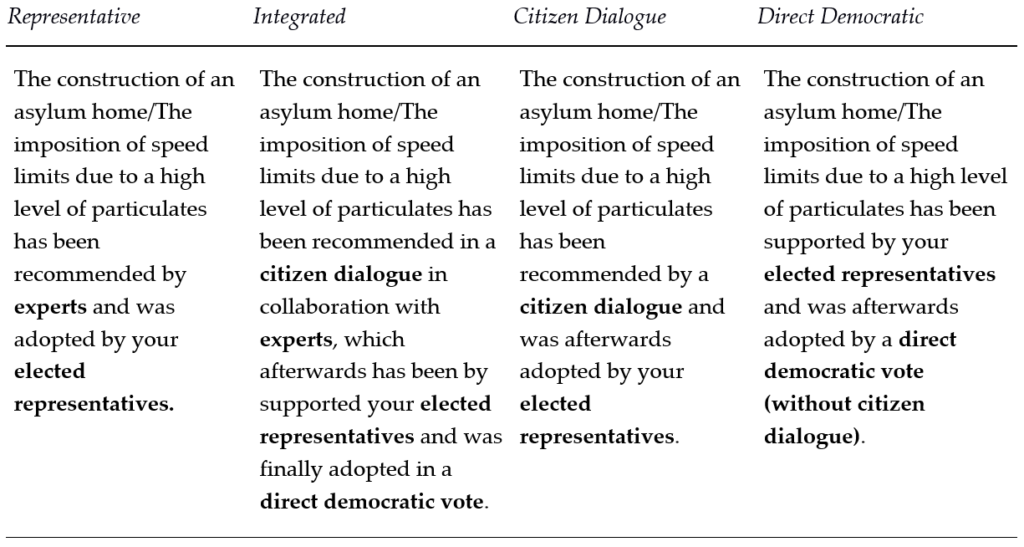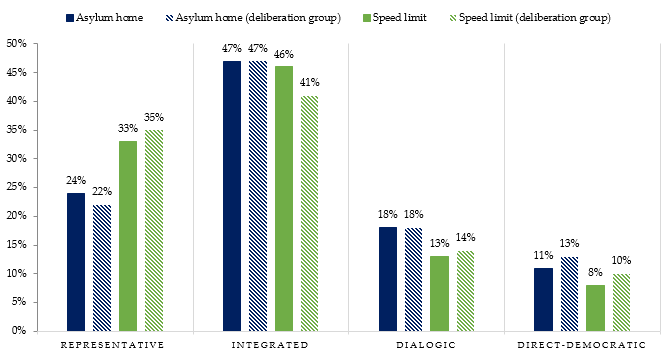Evidence from Germany: what citizens want from democracy
Although democracy is viewed positively across Europe, surprisingly little is known about the type of democratic processes citizens support. Drawing on new research in Germany, Saskia Goldberg, Dominik Wyss and André Bächtiger illustrate that disenchanted citizens want stronger involvement in political decision-making, irrespective of the concrete participation format.

Picture: Tim Reckmann/(CC BY 2.0) licence
What do people want from democracy and democratic decision-making? Are they happy with the current shape of representative democracy or do they want something else, e.g. getting more involvement and having a say when political decisions are made? Currently, there is a lot of democratic experimentation around the globe, but we have surprisingly little robust knowledge on what citizens actually want from democracy.
Existing research has offered important insights into correlates of democratic preferences. But we may tap into ill-formed preferences or non-attitudes when we ask participants abstract concepts such as preferences for democratic governance schemes on the basis of pure survey research. Indeed, we know from psychological research that people generally have difficulties in forming coherent and stable attitudes on politics. Hence, if citizens have to give answers within a few seconds without having the possibility to think through their preferences – as in existing surveys – we may be confronted with distorted answers on what citizens actually want from democracy.
To explore citizens’ considered democratic preferences, we conducted an online experiment with German citizens where we confronted participants with four different governance schemes: representative democracy, direct democracy, citizen dialogue and an integrative model. The participants were randomly assigned to three groups. A first group was presented with the different governance schemes including information about the pros and cons and then having the possibility to deliberate in an (asynchronous) online-discussion forum about the various models. A second group was presented with different governance schemes with information about the pros and cons but with no possibility to deliberate. A final group was only presented with the governance schemes, but asked twice about them. Finally, we varied the governance schemes with two decision cases. Whereas the first involved the construction of an asylum home, the second was about speed limits in the context of particulates. While participants perceived the first case as highly salient, the second case was perceived as more technical and less salient (Figure 1).
Figure 1: Four governance schemes

Note: For more information, see the authors’ accompanying article in Political Studies.
After deliberating or thinking (twice), German citizens are particularly in favour of an integrated governance scheme, combining representative democracy with dialogical and direct-democratic instruments (Figure 2). However, we also detect a sort of ‘populist’ impulse where disenchantment with the shape of current politics conduces to calls for a stronger voice of the ‘people’ and participatory governance schemes, irrespective of their concrete participation format. They prefer any alternative to the ‘status quo’, i.e. representative scheme, without any discernible differences between the direct-democratic, dialogic or integrative scheme. This result is even more remarkable given the fact that participants had the possibility to at least think twice about their preferences. We also find that when the issue is perceived as more salient, then our participants asked for more involvement in politics.
Figure 2: Preferences for governance schemes

Note: The figure displays preferences for the four democracy schemes after the experiment. N=257 (for each issue). For more information, see the authors’ accompanying article in Political Studies.
Intriguingly, we found that deliberation in itself does not lead to more informed or different preferences than information or thinking twice. We have carefully distinguished between ‘activists’ (those who posted and read comments in the chat) and ‘lurkers’ (those who only scanned through the chat), but we found no deliberation effect.
One reason for this surprising finding is that participants’ preferences were already well-structured before they were exposed to the deliberation and information treatment: we found high consistency levels between basic democratic values (citizen involvement vs. efficient and delegated decision-making) and governance schemes already before the experiment. Participants who value dialogue between all affected and direct participation were in favour of participatory schemes already before the experiment, whereas those who value delegation and efficiency preferred the representative governance model. Against our initial expectation, this shows that existing survey research on democratic preferences may not be misled on what citizens want from democracy.
This article gives the views of the authors, not the position of Democratic Audit. It was first published on LSE EUROPP – European Politics and Policy blog. For more information, see the authors’ accompanying article in Political Studies.
About the authors

Saskia Goldberg is a PhD Candidate and Research Assistant at the University of Stuttgart. Her research focuses on democratic innovations and perceived legitimacy of deliberative mini-publics.

Dominik Wyss is a Research Assistant at the University of Stuttgart. His research focuses on measuring and enhancing deliberative quality in on- and offline discussion formats.

André Bächtiger is Professor for Political Theory at the Department of Social Sciences at the University of Stuttgart. His research focuses on the challenges of mapping and measuring deliberation and political communication as well as understanding the preconditions and outcomes of high-quality deliberation in the contexts of both representative institutions and mini-publics. He is co-editor of the Oxford Handbook of Deliberative Democracy (co-edited with John Dryzek, Jane Mansbridge, and Mark Warren, 2018) and Mapping and Measuring Deliberation (co-authored with John Parkinson, Oxford University Press 2019).





 Democratic Audit's core funding is provided by the Joseph Rowntree Charitable Trust. Additional funding is provided by the London School of Economics.
Democratic Audit's core funding is provided by the Joseph Rowntree Charitable Trust. Additional funding is provided by the London School of Economics.